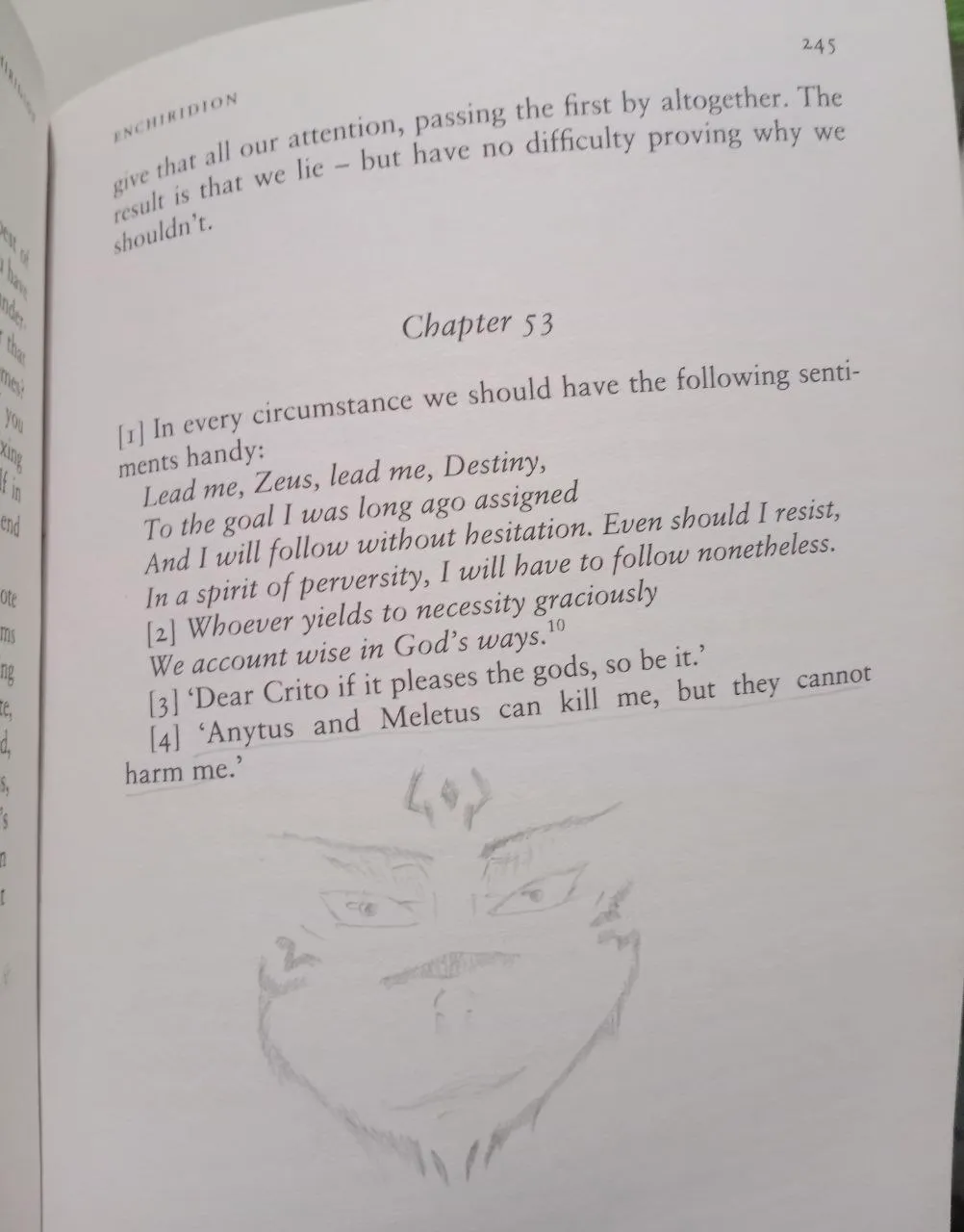For every challenge, remember the resources you have within you to cope with it. Provoked by the sight of a handsome man or a beautiful woman, you will discover within you the contrary power of self-restraint. Faced with pain, you will discover the power of endurance. If you are insulted, you will discover patience. In time, you will grow to be confident that there is not a single impression that you will not have the moral means to tolerate. -Epictetus ; The Enchiridion, Chapter 10
The Enchiridion (Inside From The Discourses - Penguin Classics Pub.) by Epictetus - 8.9/10
I would recommend this book for those individuals who tend to get into drama or are already in hot water right now. But regardless, for the regular joe, This is not that bad but I do have my own fair share of criticism of the philosophy contained within the pages in which I will expand further in this blog!
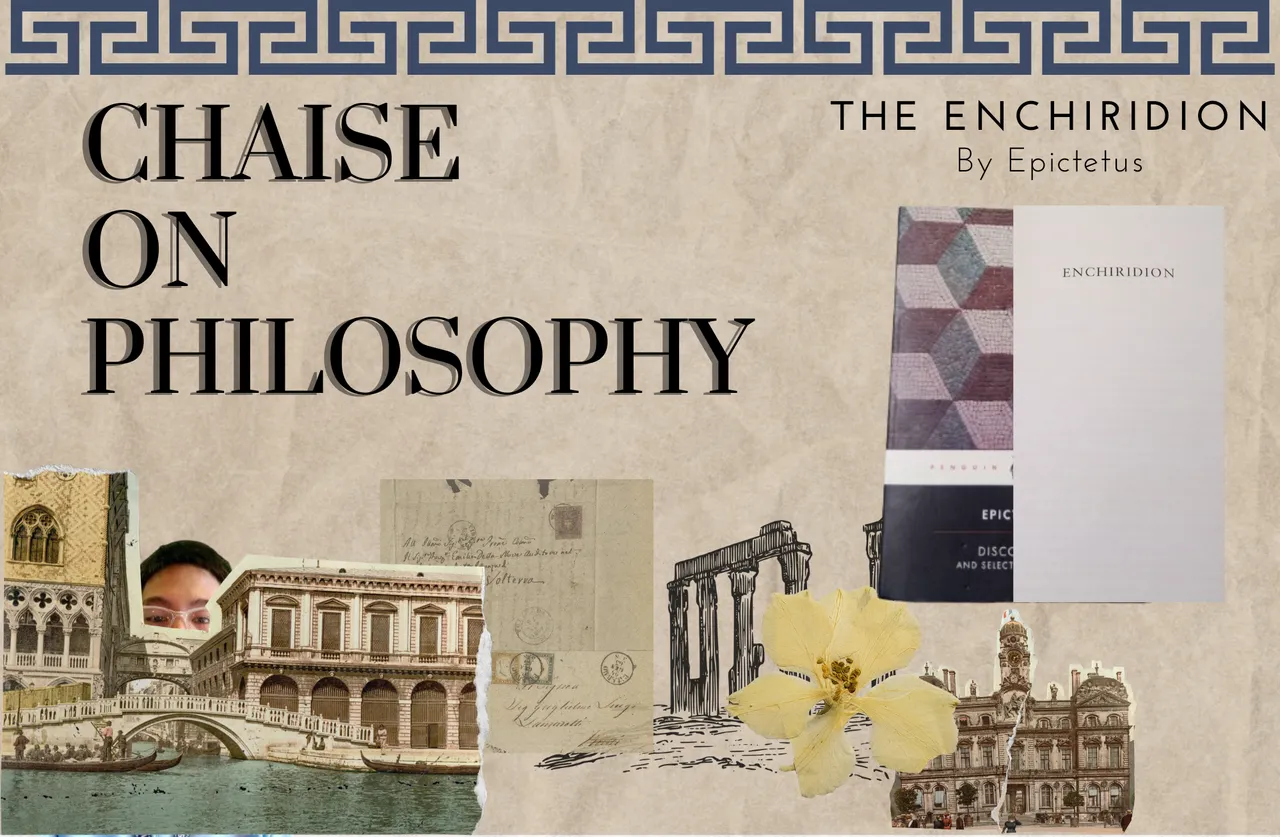
Pre-Review
Another place I found this book a lot was on Instagram, usually from those accounts who are into self-help, self-improvement, get rich grind hard, etc. Which I personally thought was odd, but I can obviously see the practical implications which is why it was recommended anyways.
The book is quite short. Each chapter contains either a phrase, a few sentences, or a couple of small paragraphs. But one thing that is consistent about inside this book is its content...
Oh, and "Enchiridion" means "Handbook" by the way.
About the author
Just a little brief summary about the author "Epictetus" to provide you with better context.
An Ancient Greek Philosopher born from the area around the southwestern parts of modern day Turkey.
He was a slave in his earlier years. Though he gained his freedom after the passing of Emperor Nero.
He founded his school of philosophy at Nicopolis in Greece.
He is one of the prominent stoic philosophers aside from the founder of this school of thought, Zeno of Citium.
Epictetus' works were actually written by his best student, Flavius Arrian. "It appears that Epictetus wrote nothing himself."
Review
Apologies in advance for my annotations in pencil, so I will type here my annotations in quotations!
The book is quite consistent with the virtues of stoic philosophy being present. And that I've found some of the passages of these chapters to be something I wholeheartedly agree with, I completely disagree with, and some caveats and "in-betweens".
Chapter 10, which is the quote entry I gave on the intro of this blog, is my favorite. It's quite empowering and pretty much just gives you the most direct answer to become antifragile...Le Sserafim reference is crazy.
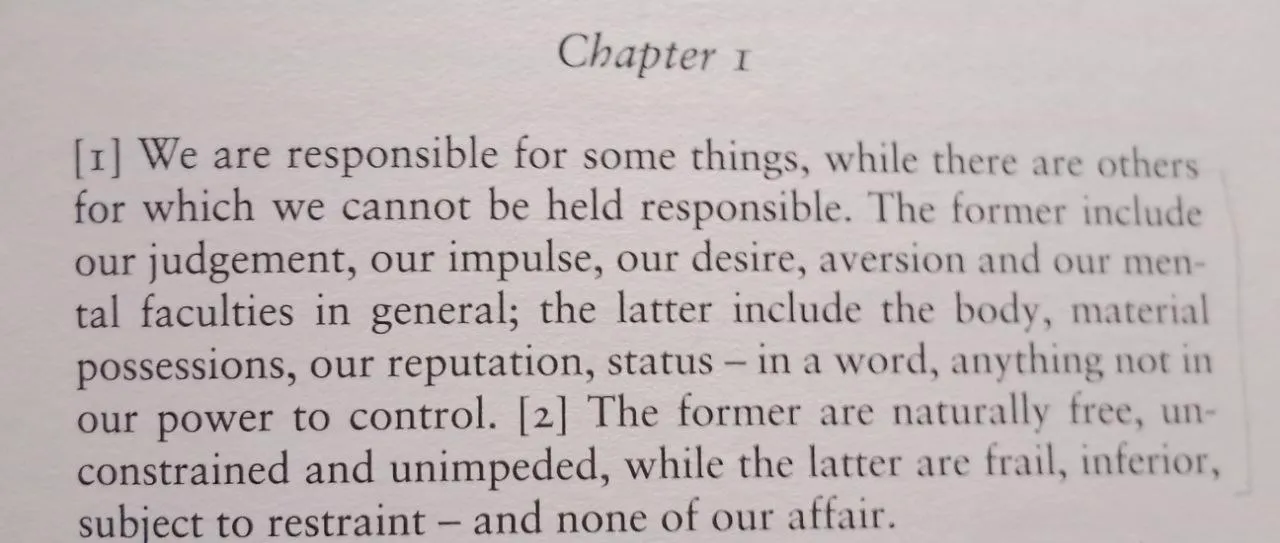
In regards to what is within our control, we can utilize it for our benefit. And to what is inevitable, the things that are out of our control, we endure, and let it pass by. Because there is nothing we can do about it.
Wake Up Call & Reminder
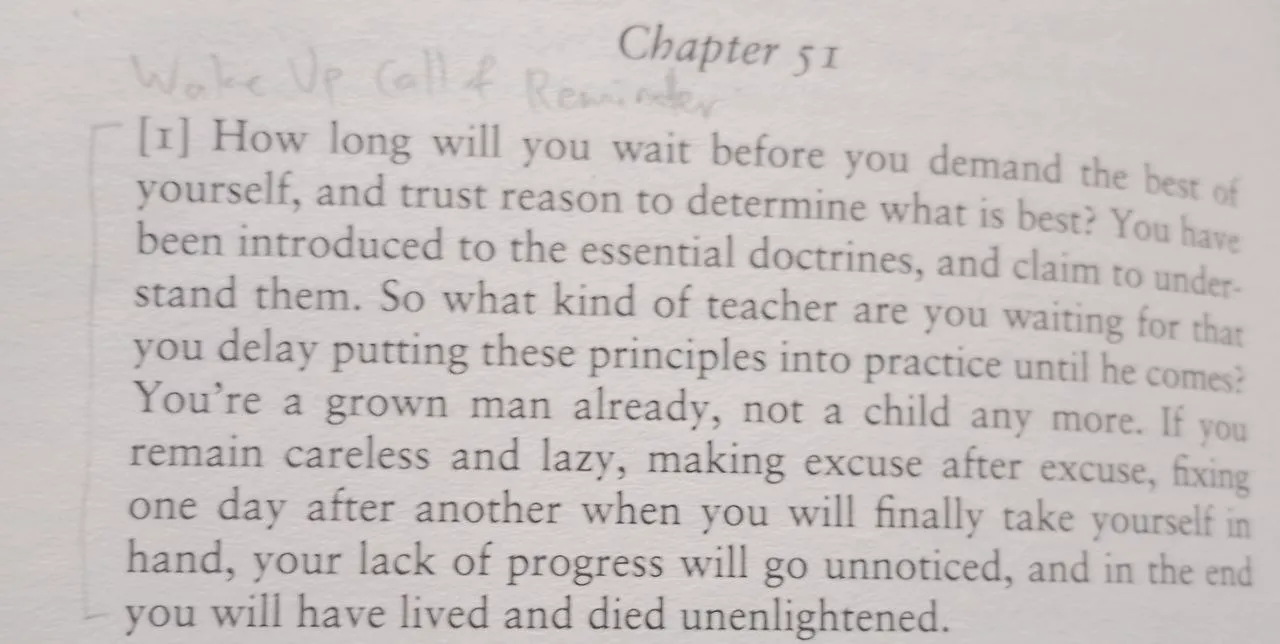
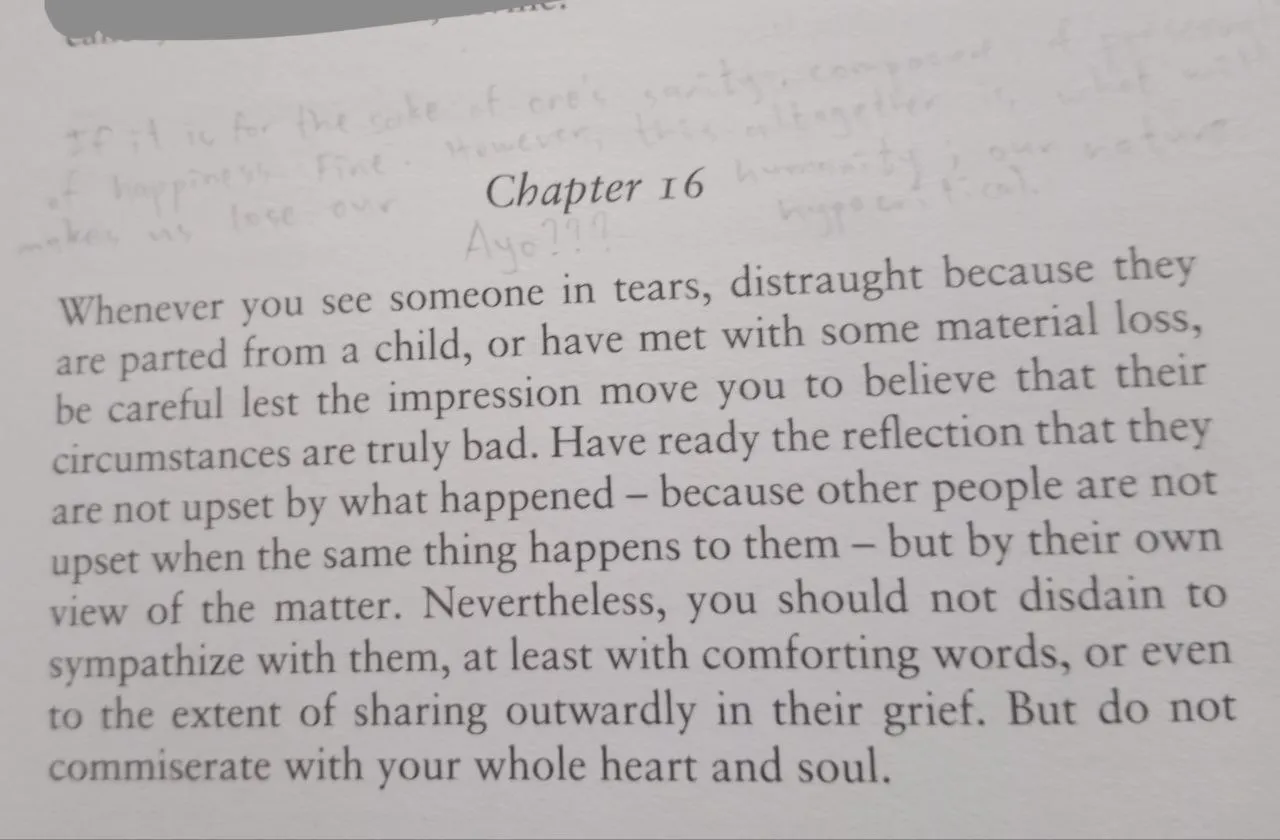
Ayo??? (shock)
If it is for the sake of one's sanity, composure, & preservation of happiness. Fine. However, this altogether is what will make us lose our humanity; our (human) nature. Hypocritical.
The reason why in my annotated critique said that this passage is hypocritical is because of the "Living in accordance to nature"(a quick google search will help) yet a part of living in accordance to our nature is to recognize our faults. That we can feel distraught, we can be vulnerable, we can grieve, we can experience something negative and react negatively because of it.
"But by their own view of the matter." It concerns beyond of what is an individual's own view of the matter on why they might be upset of something that happened, otherwise the argument—in my head—will become so absurd, it's blatantly just gaslighting.
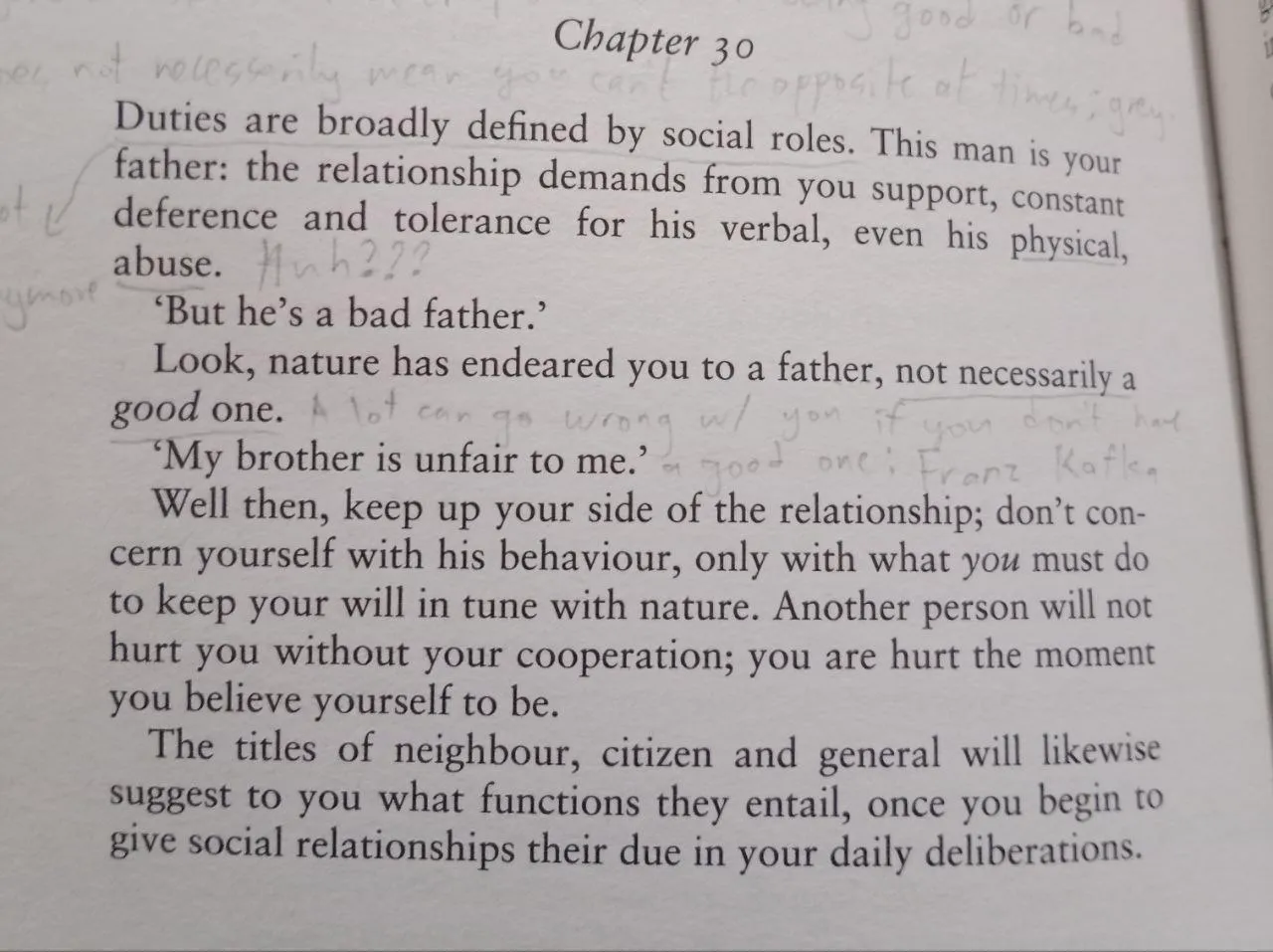
Not Anymore
Huh???
A lot can go wrong w/ you if you don't have a good one: Franz Kafka.
I am going to take an educated guess here and say that no matter how stoic you may seem, with the studies of psychology, neuroscience, etc. In relation to what I wrote, this would result in developmental issues. An example of which is Franz Kafka.
You will hypothetically become a dysfunctional member of society growing up until you finally get help in regulating yourself, especially through therapy.
And the fault is not on the child, since this individual is the subject. However, what is at fault is the treatment to this father.
"He is a father." But what encompasses a father to be properly addressed as a father is different than being an actual father which would naturally be a good one. So, I say that there is no bad father. But rather, someone who took part in procreation to initiate the process of pregnancy of his partner and when the child finally knew of sunlight, the supposed father begun to be an irresponsible individual, undeserving of the responsibility of fatherhood.
Now, I could keep going with the other titles mentioned with many more hypothetical arguments, but obviously that would be a drag...
Collapse
I would like to first address that my interpretations are open to all forms of criticisms in the comments, and that I may not be right most of the time, especially with more posts like this moving forward, so please comment if you think I'm missing something. Other than that...
Pretty impressive for a "self-help" book made during the Greco-Roman period of world history.
This book is best enjoyed for people who are at the sweet spot of wanting to improve their mentality with the affairs of the things they seem to have given value of and those affairs are of no concern for them.
As well as for people who are compatible with the teachings of this philosophy for various reasons. Truth be told, I had my earlier years of my literary infancy with following stoic teachings before expanding my horizons. And it aligned well with what I was going through mentally during that time period.
Which leads me to say that this book is for everyone to have any opinion, supporting ideas, and other things in which you may describe for you to consume in more ways than just read!
BONUS IMAGE:
